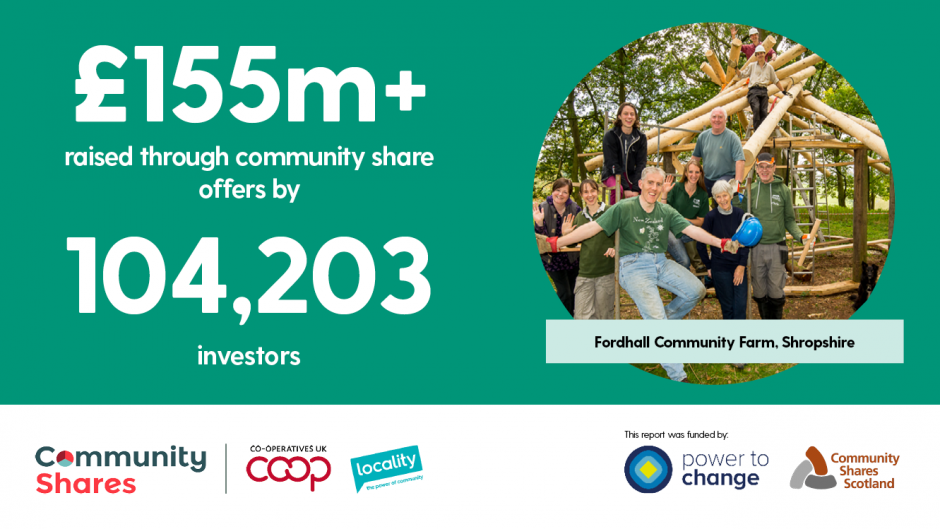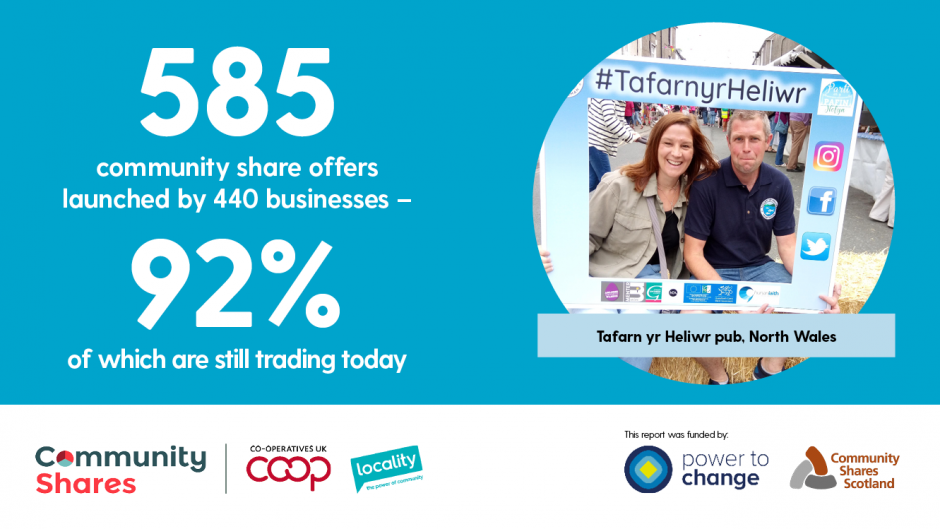Between January and June 2020, UK high streets saw a net closure of 6,001 chain store outlets – a record high, and nearly double that of the first half of last year (2019: 3,509). This decline was underway before the Covid-19 crisis, but there is no doubt that the pandemic has sped up the reshaping of our towns and cities.
Co-operatives are often cited as the more resilient business model when compared with traditional companies. Co-operatives UK’s 2020 Co-op Economy Report revealed that co-ops have almost double the chance of surviving their first five years: 76% of co-ops (up from 72% in 2019) are still operating after half a decade, compared with 42% of all new companies.
Now a new report from Co-operatives UK, Understanding a Maturing Community Shares Market, has found that of those businesses who have raised finance with community shares to date, a remarkable 92% are still trading.
Built by communities
The report, funded by Power to Change, Community Shares Scotland and Co-operatives UK, was written by Isla McCulloch, programme manager for community shares standards at Co-operatives UK. It is the organisation’s biggest ever study of the community shares market, and points to the place-based nature of raising finance for local initiatives from the people who will benefit directly from them as key to their success. On the back of the findings, Co-operatives UK is urging more communities to consider collective ownership models as a way forward.

Community shares are not new, but the term itself was formalised by the Development Trust Association (DTA, now known as Locality) in its 2008 publication Community Share and Bond Issues. Towards the end of 2008, the DTA and Co-operatives UK came together to establish the Community Shares programme, an action research partnership funded by the Cabinet Office and the Department of Communities and Local Government (DCLG). The programme ran from 2009 to 2011, during which over 70 societies registered and successfully completed a community share offer.
The Community Shares Unit (CSU) was launched in October 2012 as a joint initiative between Locality and Co-operatives UK, while Power to Change and the Architectural Heritage Fund provide match funding for community share offers through the Booster Programme. The CSU has the ultimate objective of growing a sustainable market for, and the long term success of, the use of community shares to “raise equity finance and participation, with due process and protection for investors, in a range of community and co-operative enterprises”.
Today community shares are a popular approach to raising finance for co-operatives and community benefit societies. They are still thoroughly place-based, raising funds for local projects through local people investing often small sums of money to contribute to and become co-owners of vital local enterprises – including swimming pools, pubs, heritage buildings, sports clubs and community housing – many of which would have otherwise been closed, sold or lost.
According to the research, 80% of people invest in community share offers because of the wider social or environmental benefits of the organisation. More than half (53%) of community shares investors said they felt the share offer would create a stronger community.

Investments in community share offers can be from as little as £10, with an average investment of £395 and an average annual return of 4.8%. The process is highly democratic too, with one vote per member, regardless of how much is invested. Since 2012, £155m has been raised by over 103,000 community share investors across the UK to save and create more than 440 vital community spaces and businesses.
Built in communities
Rose Marley, recently announced as the new CEO of Co-operatives UK, believes that as the coronavirus pandemic continues to drive mass business closures, more communities will consider how they might benefit from setting up community shares schemes.
“As more and more major businesses announce closures and redundancies, it’s clear that the Covid-19 pandemic is reshaping our economy in fundamental ways,” she said. “But this adversity will create opportunity, rebuilding and rethinking the way we do business and operate our communities. Now is the time to consider those co-operative business models that can sustain jobs and communities going forward. The growing community shares market is certainly one viable option.”
She added that this new research shows community shares are “an extremely effective vehicle for building sustainable businesses that are also tackling fundamental challenges”.
Organisations helped by the community shares model include Student Co-op Homes, which raised £300,000 to support a new generation of student-owned housing in universities across the UK. In Scotland, more that 3,000 people invested in GlenWyvis in 2015 to create the first ever 100% community-owned distillery in Dingwall, Scotland, raising £2.6 million in 77 days. In Wales, community shares raised over £3m to develop renewable energy co-op Awel and a 4.7MW community wind farm.

Built for communities
Alongside its key findings, the report makes four recommendations to help develop and grow community shares – and in turn the co-operatives and community businesses they finance.
It firstly calls for more specialist support for communities – and for those advising and supporting communities and businesses to do more to help people explore community shares and the wider co-op option for achieving their goals. Alongside this, the report highlights a need for more community-led economic development. “Community shares have significant potential to reduce inequalities and level up society,” it says, calling for communities in deprived areas, or those addressing specific challenges, to be supported to use community shares effectively.
There is also a need for more support for Community Shares Standards; through community shares, people invest in the businesses they care about, and receive a financial return and a stake in the business.
To protect investors, the report says governments and funders should support the community shares standards framework – an existing network of key organisations and licensed community shares practitioners, who should in turn consider ways to address barriers to using community shares.
The research acknowledges that institutions, funders and governments play a key role in growing the community shares market, and that community shares work best when part of a ‘blended’ approach for raising finance; this highlights an ongoing need for more institutional investment in community shares, and in particular, the need for governments (national and local), funders and impact investors to channel more money into institutional investment in the community shares market.
“By giving people a stake in a local business, and by encouraging community participation, businesses will flourish and help their communities to thrive too,” adds Ms Marley. “They don’t have to answer to faceless creditors or landlords who don’t have their best interests at heart. Instead, the research reveals that community share investors are driven to make a positive impact in local areas.”
For community businesses or potential investors interested in finding out more about how to get involved in community ownership models visit www.uk.coop/comshares.